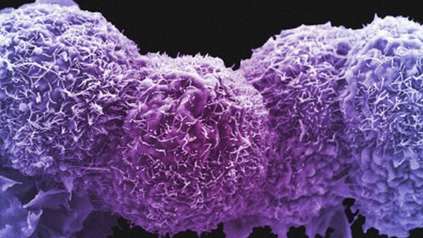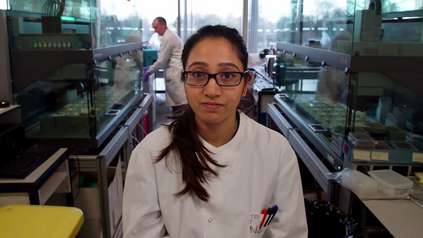Major mutation pattern in cancer occurs in bursts
New resource could help understand origins of cancer
Researchers have created a huge resource for investigating the biological mechanisms that cause cancer. The scientists from the Wellcome Sanger Institute and their collaborators identified which patterns of DNA damage – mutational fingerprints that represent the origins of cancer – were present in over a thousand human cancer cell lines. They also revealed that a major mutation pattern found in human cancer, previously linked to a virus-fighting immune response, occurred in bursts in cancer cell lines with long periods of silence in between, but the cause of these mutational bursts remains mysterious.
Published today (7th March) in Cell, the resource will enable scientists to study what causes mutations that lead to the development of cancer, directly in human cancer cells. Further understanding into these mutational processes could help researchers find novel avenues for research towards cancer prevention and treatment.
All cancers are caused by DNA mutations, and these mutations form molecular fingerprints in the DNA called mutational signatures. More than 50 different signatures have been found, many of which are caused by external factors, for example ultraviolet light exposure or tobacco smoking. Others are due to factors inside the cell such as the failure of DNA repair mechanisms. However, the causes of many mutational signatures are unknown and they are extremely challenging to study experimentally.
The researchers studied the genome sequences of 1,001 human cancer cell lines and 577 grafts of human cancers*, including the most widely used models in cancer research and therapeutics testing. They used all the known mutational signatures and catalogued which signature is present in each cancer model. This resource then allowed the scientists to choose specific cell lines and study how each mutational pattern changed over time in cancer cells.
They found that mutational signatures from known external factors like smoking or UV light stopped being created in cell lines, whereas most signatures associated with factors inside the cell continued to be generated, and at a steady rate. Surprisingly however, they discovered that two common mutational signatures associated with a DNA editing protein known as APOBEC, actually switched on and off over time in cell lines, a phenomenon they called “episodic mutagenesis”.
APOBEC DNA editing enzymes are part of the innate immune system, protecting us from infections by causing mutations in viruses such as HIV, leaving APOBEC mutational signatures in the viral genomes. APOBEC-like signatures are a major mutation pattern in cancers, found in more than 70 per cent of cancer types. A theory for this is that viruses or inflammation could activate the enzymes to mutate the human genome instead of the virus. However, cell lines are not subject to inflammation and no viruses were found, suggesting other factors are involved. Importantly, cell lines found to generate these and other signatures over time can now be used by researchers to investigate the underlying causes of mutations in cancer.
“Mutational signatures in human DNA represent traces of the mutational processes that happened in the past. In the first systematic study of mutational signatures in cell lines over time, we found that the signatures previously associated with APOBEC enzymes were the only mutations that came in bursts of activity. Cell lines that continue to generate APOBEC-associated, and other, signatures over time now provide us and other groups with a set of powerful tools to study root causes of human cancer – the origins of mutations.”
Dr Mia Petljak The first author on the paper from the Wellcome Sanger Institute
“By annotating over a thousand publically available cancer cell lines with information on mutational signatures, we have provided the largest ever resource for experimentally investigating the biological mechanisms underlying these signatures. Now, researchers will be able to choose the right cell line to work with and systematically knock-out individual genes to study how this affects the generation of any mutational signature over time.”
Dr Peter Campbell An author from the Wellcome Sanger Institute
“This international team has created a giant library of the genetic codes that underpin cancer. Scientists anywhere at any time can ‘check out’ cancer cells from the library with this genetic information, to study the specific causes of these diseases, and the mechanisms we can exploit to prevent or treat them in future. Cancer is a global problem and requires a global solution.
“This research, which supports Cancer Research UK’s Grand Challenge initiative, shows the value of drawing on the expertise of researchers from around the world to understand the root causes of cancer.”
Dr David Scott Cancer Research UK’s director of discovery research
“Human cancer cell lines carry the signatures of the mutational processes that led to the cancer. Our work investigating what causes these signatures will lead to a better understanding of the origins of cancers. If we can determine exactly what triggers these mutational processes, it could be possible to avoid or limit that exposure, and thus help towards prevention of that cancer.”
Professor Sir Mike Stratton Lead author from the Wellcome Sanger Institute
More information
Publication:
Mia Petljak et al. (2019) Characterizing mutational signatures in human cancer cell lines reveals episodic APOBEC mutagenesis. Cell. DOI: 10.1016/j.cell.2019.02.012
* The cancer models are publicly available, including 1,001 immortal human cell lines (COSMIC Cell Line Project) and 577 patient-derived xenografts (PDXs; NCI PatientDerived Models Repository) derived from a broad spectrum of cancer types. These are used by researchers worldwide as in-vitro lineages of cancer.
Funding:
This work was supported by Wellcome grants 098051 and 206194; Cancer Research UK Grand Challenge Award C98/A24032; the Li Ka Shing foundation and National Institute for Health Research Oxford Biomedical Research Centre.
Selected websites
Wellcome Sanger Institute
The Wellcome Sanger Institute is one of the world’s leading genome centres.
Through its ability to conduct research at scale, it is able to engage in bold and long-term exploratory projects that are designed to influence and empower medical science globally. Institute research findings, generated through its own research programmes and through its leading role in international consortia, are being used to develop new diagnostics and treatments for human disease.
Find out more at www.sanger.ac.uk or follow @sangerinstitute on Twitter, Facebook, LinkedIn and on our Blog.
Wellcome
Wellcome exists to improve health for everyone by helping great ideas to thrive. We’re a global charitable foundation, both politically and financially independent. We support scientists and researchers, take on big problems, fuel imaginations and spark debate.




